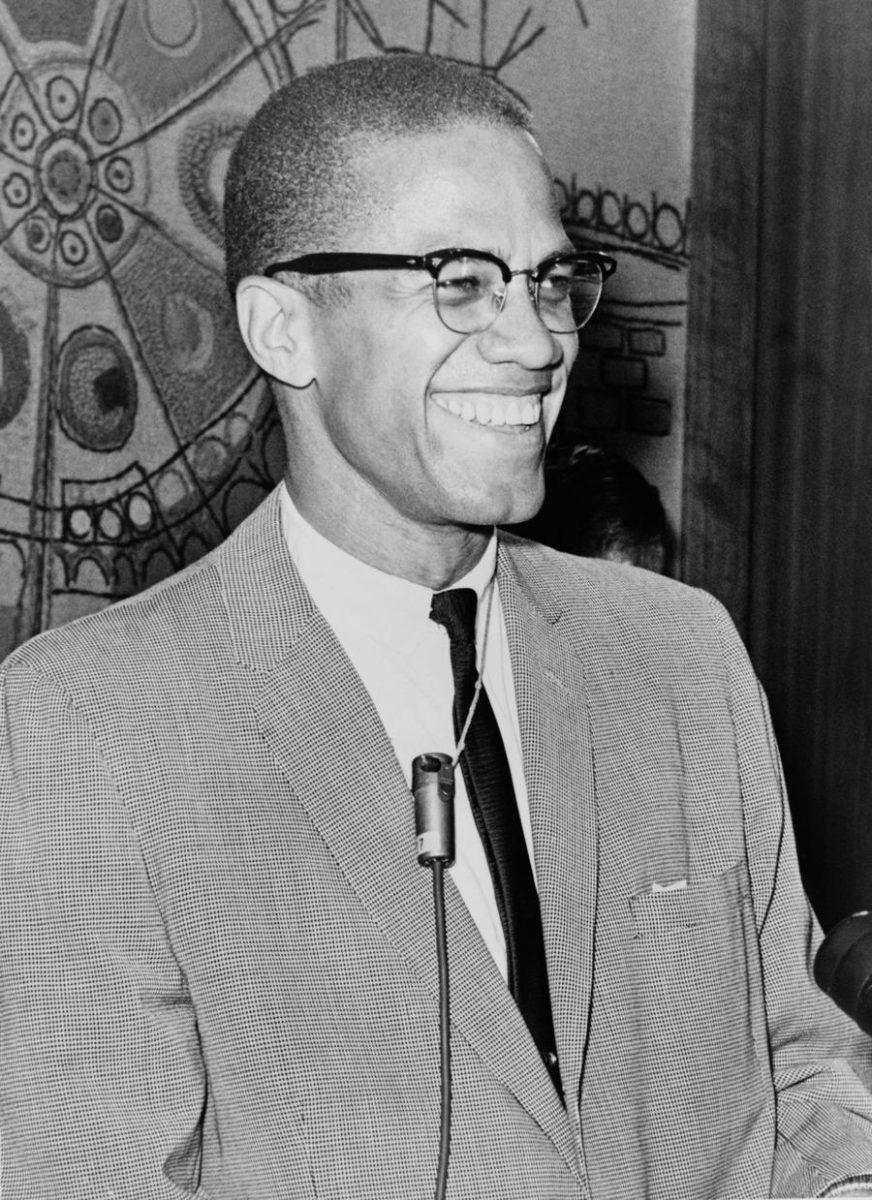The widow of Malcolm X, Betty Shabazz, played by Chelsea Williams, faces the country in a courtroom years after the death of her husband. Why? She wants to prove to the world that three men from the Nation of Islam, of which Malcolm was a member, were responsible for her husband’s death.
The Acting Company performed _X: Or, Betty Shabazz v. The Nation_ Saturday night as the first in the _Two Plays in Two Days_ series. The same cast performed William Shakespeare’s _Julius Caesar_ on Sunday afternoon. Both plays feature assassinations of prominent public figures and explore issues of power and social justice.
_X_ opens with a shoe-shiner who asks the audience, “You can judge a person by their shoes, but can you walk in them?” With these words, he transports the audience back to the courtroom where Betty will tell who killed her husband and why.
On one side, we have Betty. On the other, Louis X, a member of the Nation of Islam and former right-hand man to Malcolm, played by Jonathan-David, who advocates for his own innocence and tries to show the “real” Malcolm.
The audience was an actor in this play, representing the jury. They were even asked to rise as the honorable judge entered the stage. Throughout _X_, until the very last stage light went out, the play tried to get audience members to think about the show and their relationship to it.
Audience members were also onstage in the wings on either side of the court set-up, further representing the jury. Malcolm X, played by Jimonn Cole, was even planted in these wings by Louis. He was “asked” to perform as Malcolm, and initially gave his name as Julius, referencing Sunday’s play.
I really didn’t expect _X_ to have any humor, given that it was about a contentious assassination, but there were some lighter moments. There were no explicitly funny situations, excluding an awkward moment at side-by-side urinals, but characters delivered less serious, reactionary lines to some of the heavier moments, and Betty comes out to testify with backup dancers.
It really was about portraying who Malcolm was, and showing the murky details of his life and work. The courtroom setting was great for exploring Malcolm’s complicated relationships and the tense period at the end of his life. This play perfectly captured the unrest in his life.
Rather than diminishing the gravitas of the play’s subject matter, it made it more real and enjoyable, with deeper humanity.
Later in the play, Malcolm is getting ready to speak at an event, but he knows something is about to happen. Minutes later, he is shot.
One of the most emotional moments occurs after Malcolm’s death. Betty rushes to his side, and after a few moments he sits back up and talks with her. He tells her about why he first asked her out. This soft moment in the wake of tragedy was possibly the most moving part of the whole play.
The shoe-shiner from the beginning of the play returns, standing over Malcolm’s body. He urges the audience to think upon their own impact on history: “Will you be one that defines the times, or will you be for sale?”
The play served as a powerful social commentary, both on the era of Malcolm X and now. The controversial political environment in _X_ echoes today’s world. Director Ian Belknap was told whenever there’s a contentious political cycle coming up, you should put on _Julius Caesar_, said Devin Brain, _Julius Caesar_’s director, in a post-show discussion. They looked to other plays that showed assassinations and noticed parallels between Malcolm X and Julius Caesar. Ultimately, they decided on the format of _Two Plays in Two Days_, with the same cast for both shows.
The shoe-shiner serves as a vehicle for the play’s social commentary. The writer of the play thought of him as a man who has heard kings’ and prophets’ wisdom trickle down to him, Brain said. No one looks at him as a wise man, but he wants to “shine your souls” and reflect the nature of the era back to the audience.
The play sends simpler, more positive messages, as well. The judge and the stenographer, both Muslim women, wore hijabs during the play.
“There was a school of girls all wearing hijabs [attending the play], and as I walked out they were all beaming,” N’Jameh Camara, who plays the judge, said in a post-show discussion. “It made me think of the power of representation.”
Though the play covers dark times, it reminds audiences to look back at history and their relationship to it, to stay aware of the times they are in.
Tatiana Wechsler, who played the stenographer, Khadijah and other small parts, said in a post-show discussion: “I believe in the power of art in creating change.”








